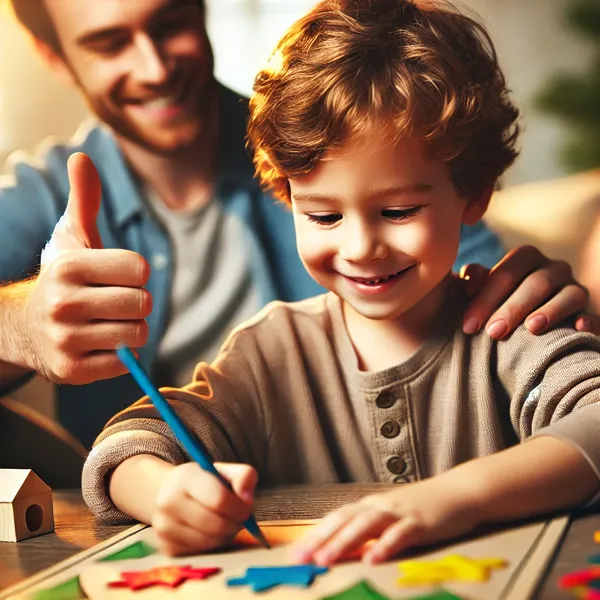How to raise confident kids? For every parent, raising confident kids is a dream. Confidence to be unafraid of trying new things, tackling challenges and secure in their skin. Growing confidence, however, takes time to happen. It is a blend of patience to keep moving forward with encouragement accompanying those little everyday actions where your child feels capable, worthwhile and loved. In this guide, we will explore
How to Raise Confident Kids
Here are easy steps to begin today to create a confident, happy adult out of your child.
1. Be a Positive Role Model

Since kids learn by seeing those around them doing it, they are one of the first sets. They will feel as you do, so they’ll read it if you have confidence in your actions/words.
Demonstrate Everyday Confidence.
You don’t have to be perfect. All that matters is showing your childlikeness under pressure, keeping calm and learning from any situation. Watching you approach challenges with a can-do spirit, they understand that courage has nothing to do with fearlessness — it means trying even when things are hard.
Pro tip: Open up to them about your experiences. Explain how it went if you did anything different or had a terrible day. We heard that sometimes, even the most straightforward story can create a positive change.
Emphasising On Making Errors & Learning
Instructing children that mistakes are simply the language of learning is paramount. Seeing you fail without falling makes them realise that imperfection is not unholy.
For example, if you down a dish or spill something, instead of getting all gingivitis, say, “Excuse me,” and show how that item will be made…. It teaches them, over time and with practice, about perseverance and being less afraid to do it again.
2. Support Independence

Confidence starts with independence. Encourage kids to do age-appropriate things for themselves; they will learn what they can and cannot manage and feel good about making progress.
Let Them Make Decisions
Children need to actively participate in their own lives, and when they do, it strengthens their feelings of control and security. When making decisions, begin with the small things, like what to wear or which book to read before bed.
- Encourage: Offer them two to three options and let them pick. This also helps them to materialise their views and decisions in the light of reality.
- My kids not only take great pride in what they produce, but it has also taught them to help around the house!
When they have responsibilities, kids can learn to trust their abilities. Chores like setting the table or feeding a pet make them feel helpful and capable.
Ideas for Tasks:
- Organise their toys
- Water a plant
- Wash veggies
3. Encourage the Effort, Not Only the Outcome

Building confidence isn’t about going on a celebration spree after every victory. Instead, praise the effort they make and encourage them to be brave enough to try.
Celebrate effort and not only results.
Praising kids for effort teaches them that trying is what matters, regardless of results. This attitude drills resilience and boldness into them, helping them understand that you do not always need to win a match to walk away with a high head.
Prayer: “Take my words and make them less effective, so it takes two seconds for the child to realise you have work to hide.”
This is followed by a Parent-Speak/Normal-Speak Translation of a Normal-Speak Phrase with Positive DNA: “I am proud that you worked hard.” This validates their effort, taking away the fear of trying again.
Promote the ability to see positives after a negative experience
If a solution does not work, show them. Help them identify the positives and what they can take from this. Long-lasting confidence only exists when your child knows they are supported and loved even if things go wrong.
An example is… If they don’t make the team or lose the game, talk about what you liked from that experience and how your child learned skills along this journey.
4. Play and Social Skills Promoted

Sometimes, they need to recharge and not have structure—playing in the backyard nourishes their sense of social acceptance and individual self-assurance.
Unit Play Encourages Cooperation and Team-building
In group play, they learn sharing, turn-taking, and cooperation. These are crucial for social confidence as they reinforce to kids that interacting and relating with others is possible.
Play Ideas:
- Cooperative board games
- Building a for playing board game
- Groups where they practice being in group settings for a play date
Playing to Solve Problems
More imagination encourages independent thinking in children. Give them chores like drawing, building, or storytelling. They will make choices and solve problems playfully, building self-esteem.
Activity Ideas:
- Writing their comic book narrative
- Building with blocks or LEGOs
- Making a “restaurant” from toy food
5. Practice Resilience in Adversity
Trust is also the result of surviving life’s minor catastrophes. Teaching kids resilience helps them see that they can bounce back from failure.
Problem-Solving Capacity for Small Challenges
Instead, when kids reach snags, steer them towards a solution. This will encourage them to do the same and stop running when they have a problem.
For example, instead of “What do we say to Toys R Us?” use, “How can we fix this toy when it gets broken? This teaches them that they can face a challenge without falling apart.
Celebrate Bounce-Back Moments
When they do conquer something, highlight it. When you say things like, “That was hard for you to do and look how well you did anyways,” they start recognising in themselves the ability to get through some tough shit.
6. Build Emotional Awareness
When we understand our emotions, we feel secure and confident. Teaching kids to understand emotions and feelings helps them gain more control over themselves.
Help Them Name Their Feelings
Show kids how to identify their feelings clearly, such as happy, sad, and angry. This allows them to let loose without feeling overloaded.
Try This: “It sounds like you are very upset. Do you want to talk about it?” This behaviour teaches children that all emotions are acceptable and how to discuss them.
Teach Simple Ways to Cope
Provide them with coping skills, such as taking deep breaths when angry or counting to ten. These small coping strategies are the foundation of emotional confidence.
Quick Tips:
- “Deep breath, everyone.”
- Why don’t we take a quick walk together?
7. Encourage Social Interaction
Social confidence comes from communicating with others, making friends and expressing what is on one’s mind.
Practice Small Conversations
Teach children to feel comfortable socially. Simple greetings or short, rehearsed conversations can only make them more comfortable in various surroundings.
Practice Ideas:
- Saying “hello” to neighbours
- You can’t ask someone how their day was.
- A new kid at school meeting the others
Encourage Group Activities
Participating in organised sports or clubs teaches children the importance of being part of a larger team. Being involved and included in a larger group boosts their self-esteem.
8. Teach Empathy and Kindness
Self-confidence is not just being sure of oneself but also knowing and respecting others. Empathy education can improve social skills and a sense of belonging in children.
Encourage Helping Others
This means that when children are taught to be kind and offer assistance, they feel empowered as agents of positive change.
Activities for Empathy:
- Toy and clothes donations to charity
- Thanking someone with a note
- Doing the laundry for a loved one
- Use Stories to Teach Understanding
Reading stories about my different experiences helps children put themselves in other people’s shoes and relate what others are feeling to their social context.
9. Set Realistic Expectations
When kids can meet expectations, they grow confident. Creating realistic and obtainable goals helps them feel more confident.
Set Small, Manageable Goals
What are attainable goals that require little work, like learning to tie their shoes or putting together a basic puzzle? Success begets success, and they become more confident.
Goal Examples:
- Riding a bicycle with training wheels
- A simple art project
- Reading a short book to get started
On Celebrating Progress, Not Just Results
You need to focus on what they have done so far, not just the final goal. This will encourage them and let students know that as long as the effort is honest, things will automatically fall into place.
10. Tell them they are loved no matter what
Most of all, children just need to know that they are loved for being them. Secure children are those who feel loved no matter what.
I Love You, And I Cheer For You Every Day
Children need to hear that they are loved and valued every single day. A few simple acts of love or supportive statements can solidify what may only have ever been a suggestion of confidence and self-belief.
Simple Ways to Show Love:
- I adore you, Whatsoever!
- I AM SO PROUD OF YOU FOR BEING YOU.
- I just automatically feel better when YOU are around.
Conclusion
It involves the everyday practices that tell kids, “You can do, and you are loved; there is nothing for which you will be ill-prepared.”
Modelling positive behavior, allowing your child to be independent and make mistakes, rewarding effort in addition to results, and, most importantly, teaching them resilience will give them that gift of long-term strong confidence.
For the record, confidence is about willingness to give it a shot, crash and burn, and perseverance. Every small step you make now for your child is a lifetime of learning; it builds the building blocks of confidence and curiosity. Then, keep cheering them on, encouraging their growth, and you will watch your confidence blossom instead.


